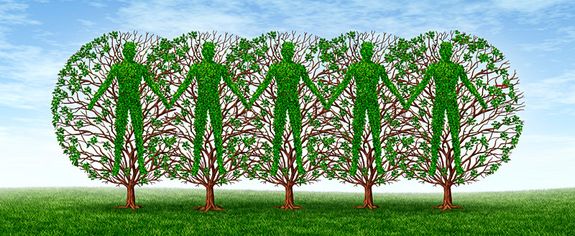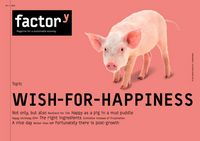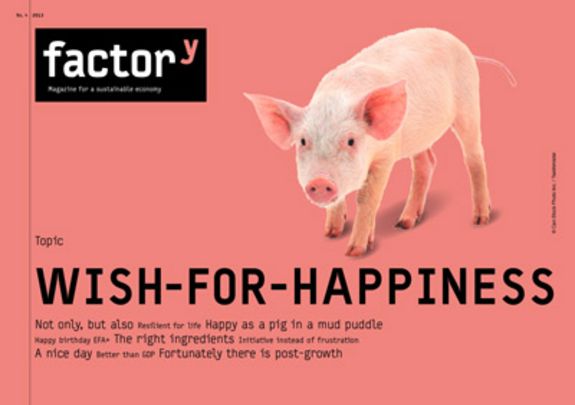Wish-for-Happiness
The good life
If you are healthy, satisfied, and successful, if you have a good life, everyone would probably say that you are happy. Happiness researchers have determined that most people in successful relationships are happy if they can autonomously complete useful tasks, if they experience little inequality and if they have possibilities to participate. Happiness is the fulfillment of people’s wishes and desires. The term happiness is complex; it encompasses moments of happiness as well as lasting bliss. It describes a happy coincidence or a life of happiness. Yet, this has little to do with material wealth. Still, most people are running on a status treadmill, as the economist Mathias Binswanger calls it. They aspire to something better, want to own, consume and earn more and, given the stress involved, are less and less able to enjoy life. Ute Scheub also points this out in the chapter on happiness in her book Beschissatlas (cheat atlas). However, business and advertising only support this pursuit of ?more?. The good life for all, however, only results from uniting prosperity, the social fabric and a sound environment. Those who advocate a sustainable society will thus also have to address happiness and wishes as well as their less resource-intensive fulfillment.
At factory, on the other hand, we do this by using a hyphenated title. Wish-for-Happiness allows the best-known happiness philosopher Wilhelm Schmid to begin with a definition of happiness. It shows where learning resilience is essential, and it demonstrates that in a country of intensive livestock farming there are indeed still some happy pigs (only in PDF-magazine). You will also learn how good life is with kale and chocolate, why a founder’s happiness essentially works towards change and how doing without a technological device can lead to wonderful moments. A travelogue from Bhutan asks whether the growth of gross national happiness is an alternative to that of the gross national product, and psychologist Marcel Hunecke explains how post-growth increases happiness.
We join in congratulating the Effizienz-Agentur NRW (agency for resource efficiency in North Rhine Westphalia) on promoting resource efficiency for 15 years – the Wish-for-Happiness may not only appeal to the birthday celebrants. We wish you all the best and hope you enjoy reading.
Ralf Bindel and the factory team
(Translated by: Sandra Walter, Annika Wagener, Anna Lena Vohl, Mareike Baudewig, Rebecca Brookes)
More articles to the topics of happiness, wishes and the good life you will find either online or in our magazine Wish-to-Happiness. Finly illustrated and lightly readable on tablet-computers and screens the PDF-magazine contains all articles and pictures as well as additional numbers and quotatians.
Themen
- The Domino Effect: the Mobility Transition as an Engine for the ‘Great Transformation’
- Cities Use the Space
- Decarbonization by 2030
- The fear of biting the hand that feeds you
- Where investing is a pleasure
- Why divestment is going to change the world
- A Robin Hood tax for climate protection
- May the Force Be with Us
- Modern Strategies
- The prerogative of interpreting the future now lies with the companies involved in climate protection”
- From Negotiating to Trading Equitably
- Can a donkey be tragic?
- Rethink rather than rebound: a sufficiency revolution must precede the efficiency revolution
- On Rebound, Prebound and Performance Gaps
- So Let Us Seize Power Then!
- With Common Property Against Political Failure
- So Let Us Seize Power Then!
- The Comforting Beauty of Failure
- “It Is Not Impossible at All.“
- Resource-light shopping
- Men Have Not Stopped Giving the Advantage to Women – So Far
- Toothpaste for Princesses and Soup for Pirates
- It is about equality
- A nice day
- Initiative instead of frustration
- The right ingredients
- Resilient for Life
- Not only, but also
- Appreciation – more please!
- Worth more than money
- Learning to value the value of goods
- Worth and Values
- The Transformative Power of Science
- Historically effective: How innovation and technology transform
- The Disappearance of Products
- Growing Older 101
- Columbus’ Egg
- It Works! In Theory at Least ...
- What If...?
- Analysing Separately – Thinking and Acting Together!
- Let’s Break Away from Determined Breaking Points
- More Gold in Waste than in Mines
- The art of separation
- Should you really DIY?
- The Aesthetics of Do-It-Yourself
- Standing on One’s Own Feet
- From the handaxe to desktop fabrication
- Using Shares to Survive the Crisis
- When Citizens participate
- Possess to Participate
- The Right Growth at the Right Time
- Gunter Pauli and Blue Economy
- When Sustainability Grows
- How we treat Growth
- Illusions about Growth









